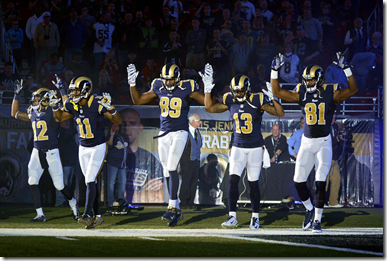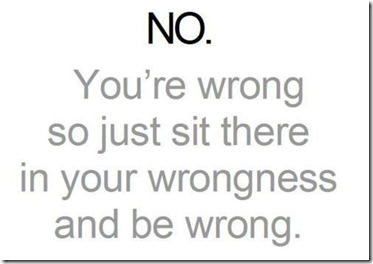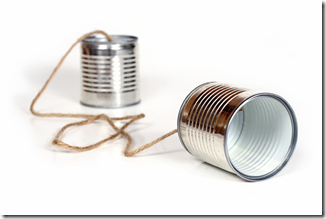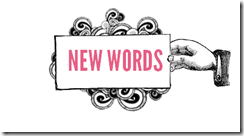The St. Louis Police Officers Association is upset with the St. Louis Rams football players who entered the field displaying the "hands up don't shoot" pose.

This seems like a perfectly reasonable response. The “hands up don’t shoot” pose has been adopted by protestors who accused Ferguson Police Officer Darren Wilson of murdering Michael Brown. The gesture has become synonymous with assertions that Michael Brown was innocent of any wrongdoing and attempting to surrender peacefully when Wilson gunned him down in cold blood.
If I was a police officer, I might be upset, too.
However, the St. Louis Police Officers Association demand that the players apologize and be disciplined strikes me as petty, purposeless, and ridiculous and only serves to cast the police officers in fragile, vindictive light.
"The SLPOA is calling for the players involved to be disciplined and for the Rams and the NFL to deliver a very public apology. Roorda said he planned to speak to the NFL and the Rams to voice his organization's displeasure tomorrow. He also plans to reach out to other police organizations in St. Louis and around the country to enlist their input on what the appropriate response from law enforcement should be.”
I recently listed the eight lowest forms of human communication. The demanded apology is first on this list.
When you demand an apology, you are asking to person you have offended you to utter a set of words that may express regret but with no guarantee of sincerity. There is no way of knowing whether or not the apology was heart-felt, since you never allowed the offender the opportunity to apologize without prompting.
Besides, what is the value of a demanded apology? Will an expression of forced regret make the police feel better?
I hope not. It’s pretty pathetic if that’s the case.
A demanded apology is nothing more than an adult version of “Take it back!” It’s a form of passive-aggressive punishment that typically results in the petty, meaningless satisfaction in knowing that you made someone say something that they would rather not have said.
When I revise my list of the eight lowest forms of communication, I’ll have to add the cliché demand that an employee to be disciplined or terminated, because this is just as bad if not worse.
Will the punishing of these five football players made the police officers feel better?
Do they think that the punishing of these players for exercising their First Amendment right will somehow deter demonstrations by other football players or other groups in the future?
If anything, a punishment would only serve to incite additional demonstrations. It’s been a source of ridicule on social media and by people like Jon Stewart on The Daily Show.
The St. Louis Police Officers Association go on to threaten the players and anyone who thinks that this form of protest represents freedom of speech under the First Amendment:
Roorda warned, "I know that there are those that will say that these players are simply exercising their First Amendment rights. Well I've got news for people who think that way, cops have first amendment rights too, and we plan to exercise ours.
Not only is there a veiled threat contained within the statement, but it’s not logically sound. The first half of the statement:
“I know that there are those that will say that these players are simply exercising their First Amendment rights. Well, I’ve got news for people who think this way…”
… seems to indicate that the police reject the notion that this demonstration is protected speech. The use of the word “simply” as a modifier implies that the players actions went beyond First Amendment rights, and the use of the phrase “people who think this way” implies that this belief is not universally acknowledged. It seems to express a belief that “people who think this way” are separate from what is right and just.
Yet the second half of the statement:
“… cops have first amendment rights too, and we plan to exercise ours.”
… seems to express a belief that what the players did was right and just under the First Amendment and the police plan on engaging in similar, legally justified actions.
You can’t have it both ways, St. Louis Police Officers Association.
There’s also no way in hell that the police will ever follow through on this threat. What do they plan on doing? Protest the NFL? Draw even more attention to their pettiness?
I doubt it.
The police are in a tough spot. They should not make it worse with ridiculous, illogical statements like this one.






















